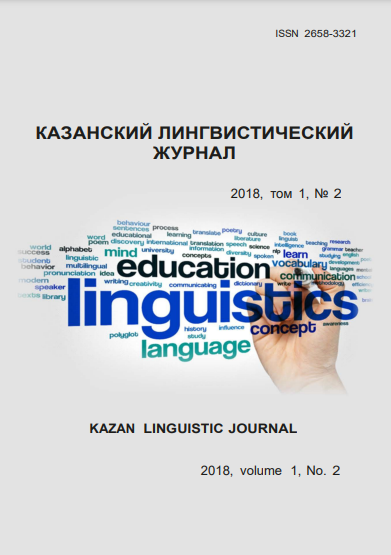The role of the comprehensive approach to the memorizing of words of a foreign language in the modern it space
Keywords:
linguistics, , memorizing foreign words, psychological pedagogy, methods of teaching foreign languages, self-reflection in learning foreign languages, mnemotechnics, mnemonics, mnemonist, IT in the study of foreign languagesAbstract
The relevance of this work is related to the focus on solving one of the most important problems of pedagogy - searching an effective way to memorize lexical units of a foreign language, which is due to a sharp increase in people's contacts with modern IT technologies. It is supposed to address the problem of the frequent use of IT-applications with the usual method of mastering a foreign language and see what effect this program has on memorization, what its parameters are significant in remembering, and whether a full replacement of textbooks with an IT application is appropriate. As a result of the work, the idea was confirmed that the use of exclusively IT-programs does not increase the level of language proficiency, or allow to master the grammatical structure of a foreign language or take into account the stylistic features and all semantic meanings of a word or a phrase. To learn and teach a foreign language successfully, it is necessary to use a wide range of ways to memorize foreign words, including IT technologies, especially valuable ones that are applications for mastering the narrow focus of one of the phenomena of a foreign language.
References
Литература
Выготский Л.С. Эйдетика. М.: ЧеРо, 2000. С. 178–199.
Зимняя И.А. Психология обучения иностранным языкам в школе. М.: Просвещение, 1991. 222с.
Кондратьева В.А. Оптимизация усвоения лексики иностранного языка. Учеб. метод, пособие. М.: Высшая школа, 1974. 120с.
Коростелев B.C. Основы функционального обучения иноязычной лексике. Воронеж: Изд-во Воронежского ун-та, 1990. 157с.
Короткова А.В. Проблема запоминания иноязычного слова в психолингвистическом аспекте// Научное сообщество студентов XXI столетия. Гуманитарные науки: сб. ст. по мат. XLV междунар. студ. науч.-практ. конф. № 8(45).
Смирнов A.A. Психология запоминания. М.: Изд-во АПН РСФСР, 1948. 328 с.
Смирнов A.A. Проблемы психологии памяти. М.: Просвещение, 1966. 422 с.
Соколова В.А. Проявление мнемических способностей студентов при усвоении иноязычной лексики: на примере неязыковых специальностей: автореф. дис. … канд. психол. наук. Вологда, 2005. 20 с.
Черноусова А.С. Лексическая единица и ее запоминание: социолингвистическое исследование. автореф. дис. …канд. филол. наук. Пермь, 2008. 25 с.
Эббингауз Г. Психология памяти. М.: ЧеРо, 2000. 816 с.
Ebbinghaus G., Hermann H. Memory: A Contribution to Experimental Psychology. New York, 1909.
Miller G.A., Selfridge J.A. Verbal context and the recall of meaningful material. // American Journal of Psychology. V. 63. 1951.
Miller G.A. The organization of lexical memory: Are word associations sufficient? In: The Pathology of Memory. New York, 1969. P. 223–236.
References
Vygotskii, L.S. (2000). Eidetika [Eydetik]. Moscow: CheRo, pp. 178–199. (In Russian)
Zimniaia, I.A. (1991). Psikhologiia obucheniia inostrannym iazykam v shkole
[Psychology of teaching foreign languages at school]. Moscow: Prosveshchenie, 222 p. (In Russian)
Kondrat'eva, V.A. (1974). Optimizatsiia usvoeniia leksiki inostrannogo iazyka [Optimization of mastering foreign language vocabulary]. Ucheb. metod, posobie. Moscow: Vysshaia shkola, 120 p. (In Russian)
Korostelev, B.C. (1990). Osnovy funktsional'nogo obucheniia inoiazychnoi leksike [Fundamentals of functional learning foreign language vocabulary]. Voronezh: Izd-vo Voronezhskogo un-ta, 157 p. (In Russian)
Korotkova, A.V. (2012). Problema zapominaniia inoiazychnogo slova v psikholingvisticheskom aspekte [The problem of memorizing a foreign language word in the psycholinguistic aspect] // Nauchnoe soobshchestvo studentov XXI stoletiia. Gumanitarnye nauki: sb. st. po mat. XLV mezhdunar. stud. nauch.-prakt. konf. № 8(45). (In Russian)
Smirnov, A.A. (1948). Psikhologiia zapominaniia [The psychology of memorization]. M.: Izd-vo APN RSFSR, 328 p. (In Russian)
Smirnov, A.A (1966). Problemy psikhologii pamiati [Problems of the psychology of memory]. M.: Prosveshchenie, 422 p. (In Russian)
Sokolova, V.A. (2005). Proiavlenie mnemicheskikh sposobnostei studentov pri usvoenii inoiazychnoi leksiki: na primere neiazykovykh spetsial'nostei [The manifestation of mnemonic abilities of students in the assimilation of foreign language vocabulary: an example of non-linguistic specialties]: avtoref. dis. … kand. psikhol. nauk. Vologda, 20 p. (In Russian)
Chernousova, A.S. (2008). Leksicheskaia edinitsa i ee zapominanie: sotsiolingvisticheskoe issledovanie [Lexical unit and its memorization: sociolinguistic research]: avtoref. dis. …kand. filol. nauk. Perm', 25 p. (In Russian)
Ebbingauz, G. (2000). Psikhologiia pamiati [Psychology of memory]. M.: CheRo, 816 p. (In Russian)
Ebbinghaus, G., Hermann, H. (1909). Memory: A Contribution to Experimental Psychology. New York, 326 p. (In English)
Miller, G.A., Selfridge, J.A. (1951). Verbal context and the recall of meaningful material. // American Journal of Psychology, 63 p. (In English)
Miller, G.A. (1969). The organization of lexical memory: Are word associations sufficient? In: The Pathology of Memory. New York, pp. 223–236. (In English)






